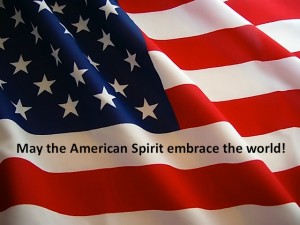American self-government is based on these eight fundamental ideas which our Founders held:
1. First, the fountainhead of American government and society is God. God is the mighty author of our existence and the moral authority for our laws. Our Founders declared it was “self-evident” truth. The Declaration of Independence contains four references to deity. They are “Nature’s God,” “Creator,” “Supreme Judge of the world” and “Divine Providence.” (John Adams also called God “the Spirit of Liberty.”) These terms make clear that in the political theory expressed by the Founders of America, God, not government, is the source of our freedom, our sovereignty, our equality, our rights, our justice, our human dignity and all else which creates a good society. Therefore we are “one Nation under God.”
2. The second fundamental idea is this: We are made in the image and likeness of God, and by virtue of our spiritual nature, every human being is sacred, sovereign and inviolable. Therefore, as the Declaration of Independence puts it, “all men are created equal.”
3. The third fundamental idea upholding America is this: God’s purpose in granting us freedom is to use it to show forth His glory in our entire existence. Some Founders, such as John Adams and Benjamin Franklin, referred to America as the New Jerusalem and the New Israel. By that they meant not a Jewish nation but rather a God-centered society whose will was to reflect heaven on earth. In that way, our pursuit of happiness would be permanently and abundantly fulfilled.
4. The fourth fundamental idea is this: Because all freedom comes from God, it carries an inherent responsibility to use it properly—that is, morally and lawfully—to fulfill our obligation to our Creator. Freedom and responsibility are therefore intimately related; without responsibility, liberty becomes libertinism or immoral, destructive behavior.
5. Idea number five: Our political experiment in self-government is predicated on each citizen governing himself morally and taking personal responsibility for his or her words and deeds. The more we obey God’s laws, the less need there is for man’s laws. The result is a godly society dedicated to glorifying our Creator. However, an immoral people is incapable of self-government. Any government it may set up will devalue honor, honesty and civility; it will legalize plundering, abridge rights and erode freedom.
6. Idea number six: Government has always been the greatest enemy of freedom, and therefore our Founders wrote a Constitution which established a minimal government for what was deemed necessary at the federal level, leaving all other powers and rights to the states and to the people themselves. The authority of the federal government was delegated by “we the people” and its powers were strictly enumerated and defined. Our Founders wanted freedom from government, not dependence on government. The Constitution and the Bill of Rights are, in simplest terms, a carefully devised system to govern the government, not the people. They were not written to restrict the citizens of America; they were written to restrict the government and to protect our rights and liberty.
7. Idea number seven: Although God is not explicitly mentioned in the Constitution, the principles expressed in the Declaration of Independence provided the philosophical and metaphysical framework for the system of government established in the Constitution. Moreover, the Founders expected that government officials would conduct themselves in accordance with that moral view of life. The American theory of government reflects the Founders’ understanding that God demands moral behavior of us all as the basis for growth to deeper understanding of our nature and destiny. Elected officials are required to take an oath or to affirm that they will support the Constitution. Obviously, supporting the Constitution means upholding and honoring the fundamental principles it embodies.
8. Last of all, our Founders wisely separated church and state, but not God and state. We have a secular government but a religious society. Our government makes no religious test of civic officials but nevertheless requires moral behavior of them, using moral standards arising from Judeo-Christianity, especially the Ten Commandments which became part of the basis of English—and hence American—civil law. God and nation are one. However, the Creator whom we recognize as the fountainhead of American government and society is not the exclusive property of any denomination. The First Amendment prohibits any denomination from becoming the established, official religion of America; likewise it prohibits government from interfering with religious freedom and thereby allows full public expression of religion according to one’s conscience.
Of all political documents in history, only the Declaration of Independence and the Constitution offer a seamless theory and practice of enlightened government. Together, they address all levels of our existence. From the physical through the mental to the spiritual, from the individual through the local, state and federal government, they declare God as the divine basis of our existence. We are one nation under God. Patriots honor that in word and deed.
# # #
